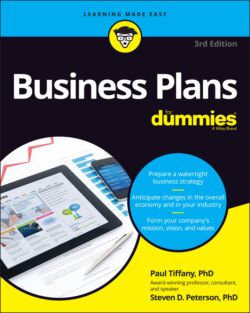Читать книгу Business Plans For Dummies - Paul Tiffany - Страница 31
Understanding the Importance of a Business Plan
ОглавлениеIN THIS CHAPTER
Drilling down on your business idea
Planning for the past, present, and future
Understanding the difference between strategy and tactics
Identifying your audience
Discovering the basics about potential investors
A famous shoe company once proclaimed, “Just do it!” That sounds like good advice, so why waste time overthinking about what it is you need to do to accomplish your objectives? Just start moving and git ’er done, right?
No. Not good advice. Definitely not. Why? We will be the first to admit that planning is not a predictive science; indeed, far from it. But when you really drill down, you begin to realize that the point of planning (business or otherwise) is not to predict the future. The point is to better inform yourself and your associates about your goals and the levers that you can pull to move up and impediments that can thwart achievement. That is, planning is about the willful pursuit of knowledge, about thoughtful and rational consideration of all the elements involved in your defined quest, and how you can best navigate the surest path forward.
But aren’t there “unknowns” out there (even unknown unknowns) that can’t possibly be unearthed through any systematic approach to planning? Time, after all, is fleeting, especially in today’s hyper-charged global business environment — you linger, you lose; the race goes to the swiftest; and all that. And if so, then ditto — why not just put your head down and plow forward (and indeed save the money you just spent for this book)?
The answer, of course, is that yes, there are unknowns, greater today than perhaps ever before, and yes, it is often better to be first. But to reiterate, planning is about process as much as (if not more than) outcomes. This business-planning process, when done systematically and conscientiously as we describe it in the pages that follow, will greatly improve your chances of success by forcing you to consider, in sometimes excruciating detail, just what it is you’re up against — and how to leverage the advantages and circumvent the pitfalls that emerge.
A “good idea” is not a passport to success — lots of people have good ideas every day. In fact, the business terrain out there is littered with the desiccated remains of what once sounded like a “good idea” but never got beyond that point (anyone recall Pets.com?). Meanwhile, a good idea hitched to a sound plan for moving ahead is something that both experience and history have shown to be a highly positive factor — take a look at Amazon.com for just one example. Your purchase of this book is not an expense. Rather, it is an investment — and one that will yield dividends to those who take the process seriously. We don’t, and can’t, guarantee success with our suggestions for how to plan your business venture, but we do believe that the odds will improve substantially by following the guidelines we offer. So, OK, just do it — but first do your homework (and also eat your spinach); you won’t regret it. And as for that need for speed, just ask the second mouse at the cheese trap what it thinks of being first… .
In this chapter, we look at why having a plan is so important and how you can use your business plan in different ways. We talk about your business plan as a guide to your company’s future and a record of where you’ve been and how you’ve done. We help you take the first steps in describing what you actually plan to do and how you plan to do it. Finally, we look a little closer at two important groups: investors who may want to own a piece of your business and lenders who provide funds to help you grow.
